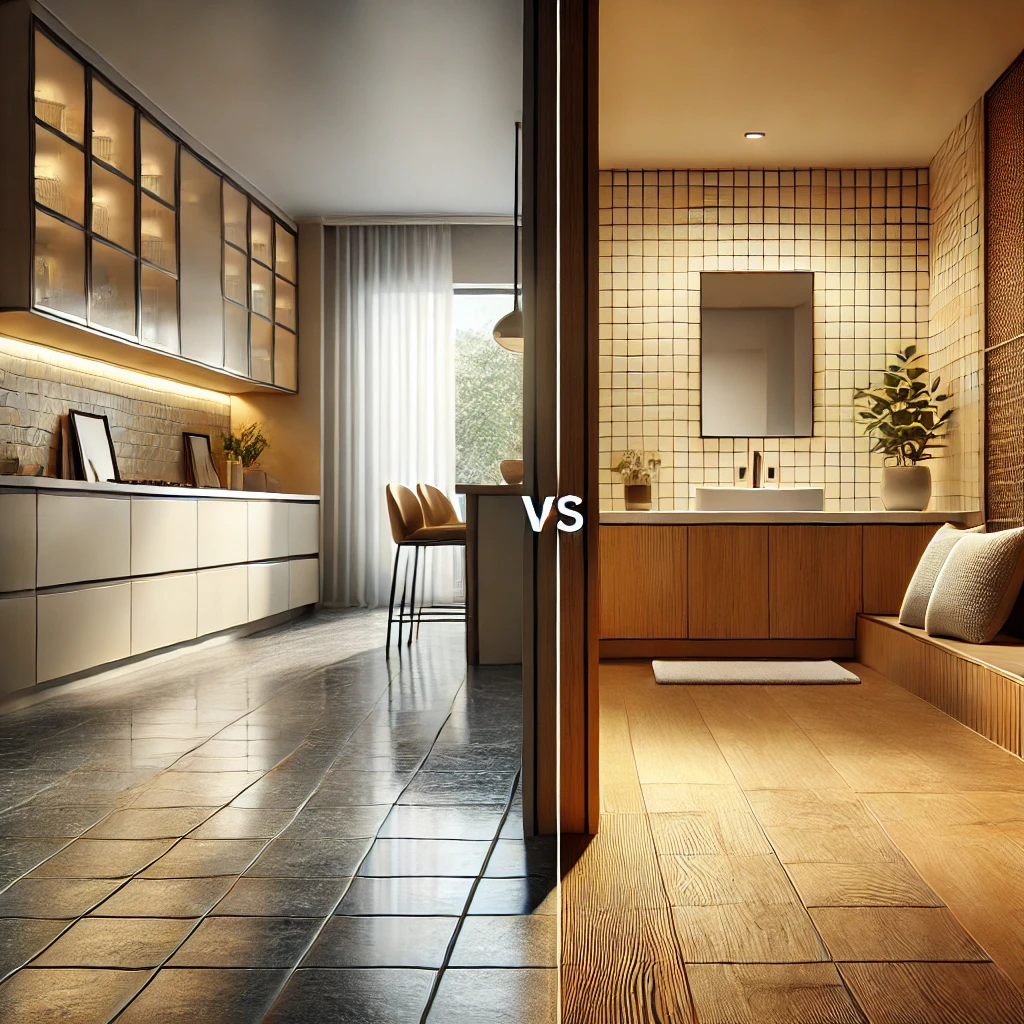Introduction: Why Are Thick Tiles the Unsung Heroes of Flooring?
When you step into a beautifully tiled space—be it a luxury hotel lobby, a bustling commercial kitchen, or your own sun-soaked terrace—do you ever wonder what keeps those surfaces looking flawless year after year? The answer often boils down to one keyword: thick tiles. If you’re ready to make a bold, lasting upgrade, this comprehensive guide (packed with actionable tips, expert analogies, and real-world insights) will help you understand why thick tiles are redefining the world of flooring and wall finishes.
What Are Thick Tiles?
Thick tiles are a type of flooring or wall tiles with a thickness of 10-20mm, offering more durability and resistance than standard tiles. Thick tiles are like the “SUVs” of the tile world – they are built to demand stronger conditions, and always provide more resilience than standard tiles.
The Difference: Thick Tiles vs. Regular Tiles
Ever tried stacking thin crackers versus chunky cookies? The difference in robustness is easy to spot! Thick tiles also provide:
– Greater impact and wear resistance.
– Less risk of chipping and cracking.
– Improved load-bearing capacity.
– Enhanced insulation.
Regular tiles may be cheaper and more convenient to install in low-traffic areas, but their lack of durability is a major disadvantage.
| Feature | Thick Tiles (10–20mm) | Regular Tiles (6–8mm) |
| Breaking Strength | Excellent | Moderate |
| Insulation | Superior | Basic |
| Wear Resistance | High | Moderate |
| Applications | Indoor/Outdoor | Mostly Indoor |
| Maintenance | Low | Variable |

Why Thickness Matters: Dissecting User Pain Points
Users searching online for “best tiles for high traffic,” “anti-crack flooring,” or “moisture resistant tiles,” are looking for solutions to problems like the following:
- Cracked tiles beneath heavy furniture or foot traffic.
- Faded surfaces on outdoor patios exposed to the sun.
- Slippery tiles located around swimming pools or restrooms.
- Sloping edges in retail kitchens.
Thick tiles not only resolve these problems, they proactively safeguard against them.
The Key Benefits of Thick Tiles
Why are thick tiles so popular among seasoned architects and homeowners? Let’s take a look at the aspects that set them apart:
- Durability and Longevity: The endure years of use and are ideal for hallways, kitchens, and open spaces.
- Resistance to Breaking Loads: Foot traffic and heavily laden furniture are of no concern.
- Thermal Shock Proof: Abrupt changes in temperature are no issue.
- Stain and Water Resistance: Undamged by red wine and muddied footwear.
- Design Versatility: Earthy, glossy, natural stone and marble finishes.
Categories of Thick Tiles and Their Uses
Different materials and designs differentiates thick tiles:
- Vitrified Tiles: Hard, moisture-proof and stain resistant, they can be used in most spaces.
- Porcelain Tiles: For use in chic but durable surfaces, these have a sleek appearance and high-performance grade.
- Full-body Tiles: The intricate pattern is carved deep so the design will withstand years of use without losing its vibrancy.
Commercial kitchens
- Retail stores
- Office corridors
- Pool decks
- Garage floors
- Outdoor patios and garden paths
The External Perfection: Thick Tiles for External Areas
Outdoors, grass, gravel and wood may be visually appealing, but thick tiles are unbeatable for their enduring nature and low maintenance. Thick tiles are great for:
- Driveways and parking areas
- Terraces and patios
- Swimming pool surrounds
- Garden pathways
Thick Tiles for Areas With Heavy Foot Traffic
Every step counts in a hospital corridor or a busy restaurant kitchen. Thick tiles are crafted to withstand stylish abrasion. Did you know? Retailers report a 40% reduction in tile replacement costs after the switch to thick tiles in main walkways.
Style and Design Options: No More Compromises
Thick tiles have certainly evolved from looking boring and unattractive. They now come with:
- Glossy marble looks reminiscent of luxury hotels
- Warm Earthy tones with a rustic touch reflecting cozy cottages
- Expensive looking metals
Almost any color and pattern one can think of. With thick tiles, you can finally have durability and design!
Durability Data: How Thick Tiles Stack Up
Time to get data driven! Tiles between the thickness of 15-20mm have a breaking strength of 4,000-8,000N compared to 1,500-2,500N for thinner tiles. With these tiles, your floor would be able to endure the weight of a small car!
- Mohs Hardness (scratch resistance): >7/10
- Abrasion volume loss: less than 120mm³ after heavily used over the years
- Water absorption: less than 0.5% (nearly waterproof)
Installation: What Makes Thick Tiles Unique?
While most think it would be hard to install thick tiles, it’s actually quite the opposite. Their strength provides a smooth, flattened finish which aids in the annoying lippage. Achieving a sturdy subfloor, quality mortar, and level floor ensures optimal results.
Cost Analysis: Are Thick Tiles Worth the Investment?
Lets look at the numbers:
- Standard tiles: ₹25-50/sq.ft
- Thick (premium) tiles: ₹80-120/sq.ft
When considering reduced replacement frequencies in conjunction with lower maintenance costs and increased property value, thick tiles appear to be more economical in the long run.
Insulation and Comfort: Not Just For The Surface
Thicker tiles, akin to double-paned windows, help retain warmth in winter and coolness in summer, and their dense composition helps absorb sound. This feature is particularly useful in apartments or multi-storey houses.
Simplified Cleaning
Thick tiles are easy to care for and require the following:
- Regular sweeping or vacuuming removes dirt and debris.
- Mild cleaning agents will maintain a lasting shine, while harsh chemicals will dull the surface.
- Grout sealing is advisable to prevent staining and moisture build-up.
Thick tiles do not need special treatment or vigorous scrubbing. They flourish with uncomplicated care.
Thick Tile Applications: Practical Examples
Case Study #1: The Commercial Kitchen Makeover
In a remodel, a busy hotel kitchen replaced 8mm tiles with 15mm full body vitrified tiles. The result? No cracks over three years, reduced repair calls by 50%, and an overall better appearance and cleaner workspace.
Case Study #2: Pool Deck Transformation
A homeowner’s association replaced wooden decking with 20mm thick porcelain tiles. The new surface provided anti-slip protection, stain resistance, and maintained its pristine appearance despite constant exposure to rain and harsh sun.
Case Study #3: Hospital Floors
The installation of heavy duty tiles in busy hallways significantly decreased observable wear and maintenance costs. Patients and staff, on the other hand, noted the softer sounds of foot traffic and improved traction.
Common Mistakes to Avoid When Using Thick Tiles
- Skips substrate prep: Make sure to level the subfloor. Thick tiles will not tolerate bumps.
- Using cheap adhesives: Quality mortar is a must for heavy duty tiles.
- Overlooking grading: A thick tile may not be rated for outdoor use. Specifications must be checked for weather resistance.
Advanced Tips: Getting the Most Out of Thick Tiles
For thick tiles to truly shine:
- For bathrooms and pools, select slip resistant tile textures.
- In areas that are prone to scratching, full body vitrified tiles are a good option.
- For ultimate comfort, thick tiles will transfer heat beautifully coupled with under-tile heating.
- Regular inspections of the grout lines and sealing should be done annually.
Guide for Selecting Best Thick Tiles
- Measuring the area should be done accurate. When ordering, add 10% for cuts and breakage.
- Select correct tile type: vitrified, porcelain or full body.
- Confirm thickness for application: minimum 10mm for indoor, 15-20mm for outdoor or high traffic areas.
- Confirm requirement of slip resistance for relevant areas.
- Using the correct adhesives and grouting is essential.
- Maintenance should be planned for and be simple cleaning and annual grout sealing.
- Warranty and certifications should also be compared.
All You Need To Know about Thick Tiles
Q1: Are thick tiles suitable for outdoor use?
Absolutely! They are designed to be durable and weather resistant for outdoor use.
Q2: Are thick tiles more expensive to install?
Yes, the initial outlays are higher, but the maintenance and replacement costs are lower, resulting in higher long-term savings.
Q3: Will thick tiles help with soundproofing or insulation?
Absolutely! Both sound and heat will have a harder time passing through these tiles.
Q4: Can I use thick tiles in my bathroom?
Absolutely. Their ability to resist moisture means they are perfect for wet areas.
Q5: Do thick tiles require special care?
No, the tiles can be maintained with light cleaning and grout maintenance which makes them simple to keep in great condition.
Conclusion: Ready to transform your space?
If you need a flooring or wall covering that is low maintenance, timeless, and robust, thick tiles are your answer. Their use during a home renovation or in a commercial project can deliver remarkable value in terms of strength and sophistication.
So, why wait to elevate your space with thick tiles?
CTA: Take the next step!
Do you want to feel and see the advantages of thick tiles? You can talk to a design consultant, get free samples, or have a thick tiles installation scheduled professionally. Make the upgrade and be the the first to step into a space that truly lasts.
Five Custom FAQs for Your Thick Tiles Journey
1. What are the advantages of using thick tiles as compared to concrete or natural stone for outdoor applications?
Thick tiles are easier and lighter to install while providing the same durability and load-bearing capabilities as thick tiles along with better design possibilities.
2. Does the use of underfloor heating thermostats affect thick tile heating?
Certainly! Thick tiles facilitate the installation of heated floors and, because of their density, guarantee effective heating circulation.
3. Is it possible to reuse thick tiles after renovation?
Yes, many designs of thick tiles are made to be re-installed after being removed, making it easy to reuse after renovation.
4. What are the measures taken for slip resistance on thick tiles used in swimming pool areas?
Select anti-slip textured finishes and always verify the slip rating for outdoor tiles prior to use.
5. What is the environmental impact of thick tiles?
Thick tiles are manufactured with eco-friendly materials and processes which class them as being green.



